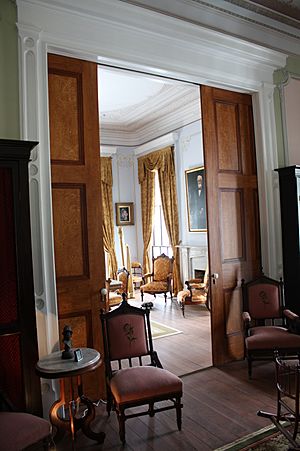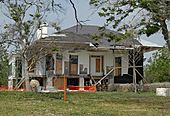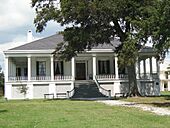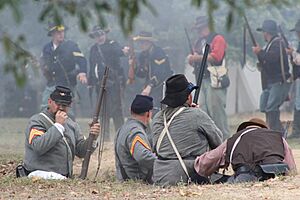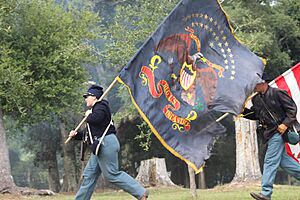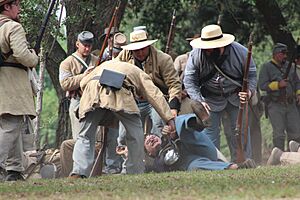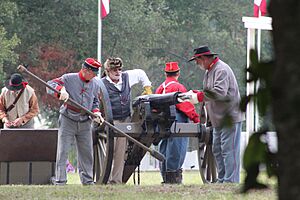Beauvoir (Biloxi, Mississippi) facts for kids
|
Beauvoir
|
|
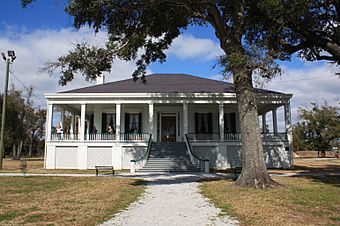
Beauvoir in February 2010
|
|
| Location | 2244 Beach Blvd, Biloxi, Mississippi |
|---|---|
| Built | 1848 |
| NRHP reference No. | 71000448 |
Quick facts for kids Significant dates |
|
| Added to NRHP | September 3, 1971 |
| Designated NHL | November 7, 1993 |
Beauvoir is a historic estate located in Biloxi, Mississippi, right along the beautiful Gulf of Mexico. It was the home of Jefferson Davis, who was the President of the Confederate States of America during the American Civil War. He lived here from 1876 until his death in 1889.
The National Park Service recognized Beauvoir as a very important place, calling it a National Historic Landmark in 1974. This means it's a special site that helps tell the story of American history.
After the Civil War, Davis faced some tough times. A kind woman named Sarah Dorsey, who owned Beauvoir, invited him to live on her property. She offered him a small house near the main one where he could write his memoirs. Davis accepted and lived there for the rest of his life with his wife, Varina Davis, and their youngest daughter, Winnie.
Sarah Dorsey later left Beauvoir to Jefferson Davis in her will. After Davis passed away in 1889, his wife Varina inherited the estate. In 1902, she sold it to the Mississippi Division of the Sons of Confederate Veterans. Her wish was for it to become a home for Confederate soldiers who had fought in the war, and later, a memorial to her husband. It served as a veterans' home until 1957. Today, the main house is a museum, and a library was added in 1998.
Beauvoir has faced powerful storms, including Hurricane Camille in 1969. It was also badly damaged by Hurricane Katrina in 2005, but it has since been carefully restored and reopened for visitors.
Contents
What is Beauvoir Like?
The name "Beauvoir" means "beautiful to view" in French, and it certainly lives up to its name! When Jefferson Davis lived there, the estate covered about 608 acres (2.46 square kilometers). It was surrounded by tall cedar, oak, and magnolia trees, and even had an orange grove. The house faces the Gulf of Mexico, offering stunning views, and Spanish moss hangs from many of the old trees. A natural waterway called Oyster Bayou runs through the property, fed by springs. Part of the estate still has a forest that looks much like it did in the 1800s.
Today, Beauvoir is about 52 acres (21 hectares) in size. It's located across the highway from Biloxi Beach. The site includes the main house, which is built in a Louisiana-raised cottage style, a beautiful botanical garden, and a former home for Confederate veterans. There's also a modern gift shop, a museum about Confederate soldiers, the Jefferson Davis Presidential Library and Museum, and a historic cemetery. This cemetery includes the Tomb of the Unknown Confederate Soldier. Many buildings were destroyed by Hurricane Katrina, but replicas have been built or are planned.
Beauvoir's Story
Beauvoir was built by James Brown, a businessman, starting in 1848 and finishing in 1852. In 1873, it was sold to Samuel and Sarah Anne Ellis Dorsey. Sarah Dorsey was a writer and historian.
In 1876, Sarah Dorsey invited Jefferson Davis to stay at Beauvoir. She offered him a small cottage and helped him write his book, The Rise and Fall of the Confederate Government. Davis moved into the cottage in 1877, and his wife Varina later joined him.
Davis planned to buy the property in 1879. However, Sarah Dorsey passed away that same year. In her will, she left Beauvoir to Davis and his daughter.
Davis, Varina, and their youngest daughter, Winnie, then moved into the main house. Davis lived there until he died in December 1889. Varina stayed at Beauvoir while writing her own book about her husband. She and Winnie moved to New York City in 1892.
After Winnie died in 1898, Varina inherited the property. In 1902, she sold much of it to the Mississippi Division of the Sons of Confederate Veterans (SCV). Her goal was for it to be a home for Confederate veterans and their families, and later, a memorial to her husband. The SCV built many buildings, including barracks, a hospital, and a chapel. From 1903 to 1957, about 2,500 veterans and their families lived there. Many were buried in the cemetery on the property.
In 1941, the main house opened for public tours. Over time, a Confederate Museum, a gift shop, the Tomb of the Unknown Confederate Soldier, and the Jefferson Davis Presidential Library and Museum were added.
In 1969, Beauvoir survived Hurricane Camille, though it needed some repairs.
The Jefferson Davis Presidential Library opened in 1998. It holds Davis's personal books and papers, an exhibit about his life, and a theater.
Hurricane Katrina's Impact
Damage to Beauvoir
On August 29, 2005, Hurricane Katrina hit the Biloxi-Gulfport area directly. Beauvoir's main building was badly damaged, losing its porches and part of its roof. However, it was not completely destroyed. Other buildings, like the Hayes Cottage, the Library Pavilion, a barracks replica, the Confederate Museum, and the director's home, were destroyed. The first floor of the Davis Presidential Library was flooded, and about 40% of its collection was lost.
Even with the huge damage, the hurricane actually helped by making detailed government photos of the building available. These photos showed important architectural details and how the original building was put together. For example, they showed the red-brick pillars in the basement and the wooden frames of the walls. The house was reinforced by six fireplaces, and five of their chimneys stayed strong, helping the walls stand even when underwater.
The green storm shutters on the back of the house protected the windows from the 24-foot (8-meter) storm surge. Many original parts of the house, including windows, remained intact.
Restoring the Buildings
Because so many homes in Mississippi were damaged by Hurricane Katrina, restoring Beauvoir took time. However, since it's a U.S. National Historic Landmark, the Federal Emergency Management Agency (FEMA) approved government help for its repair.
With money from federal, state, and private groups, restoration of the Beauvoir Mansion began in early 2006. On June 3, 2008, which was Jefferson Davis's 200th birthday, the mansion was fully restored and reopened. It now looks just as it did when Jefferson and Varina Davis lived there.
By the winter of 2009, Davis's library and Hayes's cottage were rebuilt and open for tours.
The Jefferson Davis Presidential Library and Museum reopened in June 2013. Many items that were damaged by Hurricane Katrina were recovered and repaired. The historic kitchen behind the mansion was also rebuilt. The total cost for the renovation was about $17.2 million from state and federal funds.
Restoring the Collections
About 60% of Beauvoir's collections were saved. Before Katrina, the Jefferson Davis Presidential Library had 12,000 books on U.S. history, Southern history, and the American Civil War. It also had photos, letters, manuscripts, and records from Confederate heritage groups and the veterans' home. Most of these records survived, except for those on display in the museums.
Volunteers and the Mississippi Army National Guard helped save what they could. It was very hard to sort through the debris because the room with real china and artifacts was next to the gift shop, which had replicas.
Beauvoir Today
Today, Beauvoir is owned and managed by the Mississippi Division of the Sons of Confederate Veterans. The museum shares stories about the Confederacy and its history. The State of Mississippi provides an annual grant of $100,000 for its upkeep.
Activities and Events
Beauvoir hosts several events throughout the year. The Fall Muster, held in October, is a major highlight. Visitors can watch battle reenactments and learn about life during the Civil War.
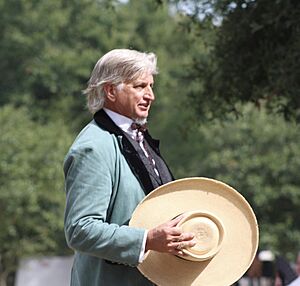
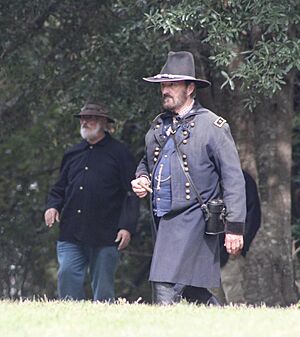
Visitors can also watch a film about Jefferson Davis's life, narrated by an actor playing his friend, Iowa Senator George Wallace Jones.
Special Recognitions
Beauvoir is listed on the National Register of Historic Places. It has also been named a National Historic Landmark and a Mississippi Historical Landmark. These designations show how important Beauvoir is to the history of Mississippi and the United States.
 | John T. Biggers |
 | Thomas Blackshear |
 | Mark Bradford |
 | Beverly Buchanan |




